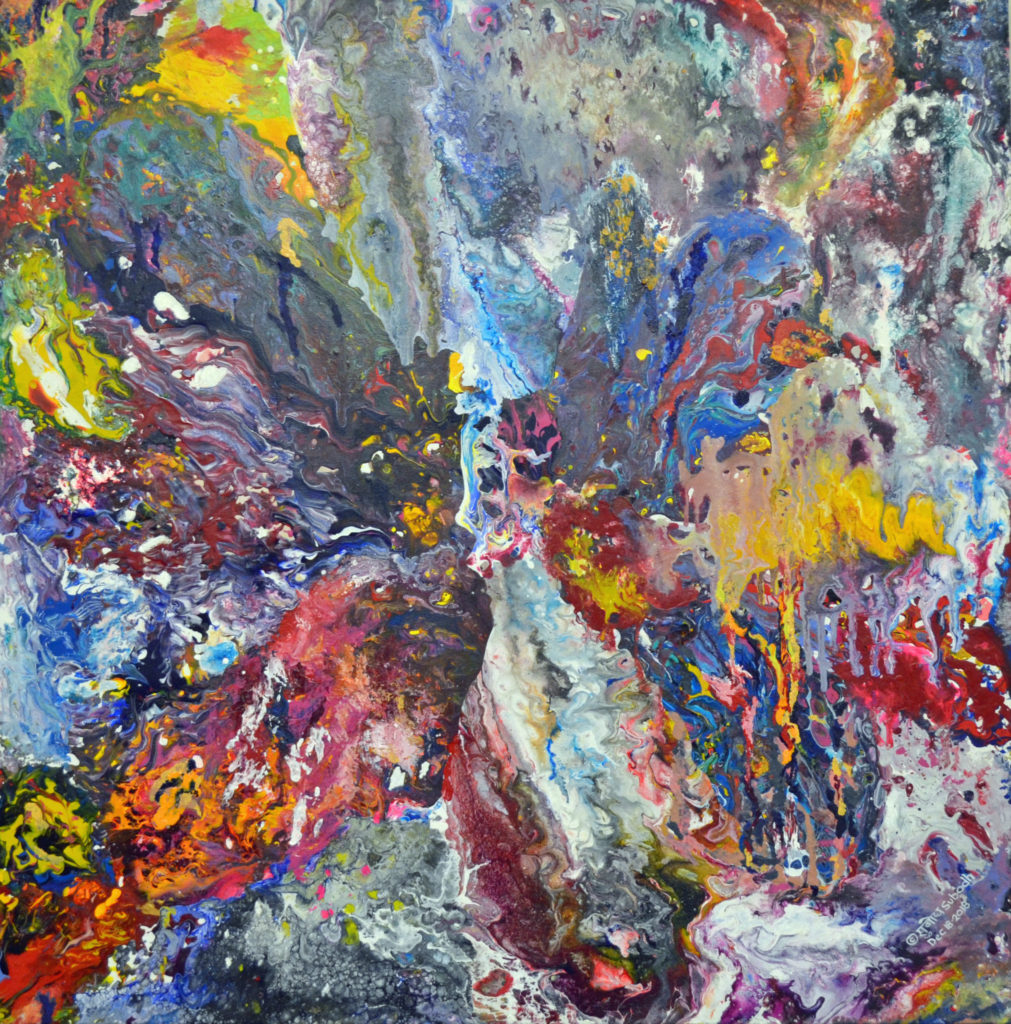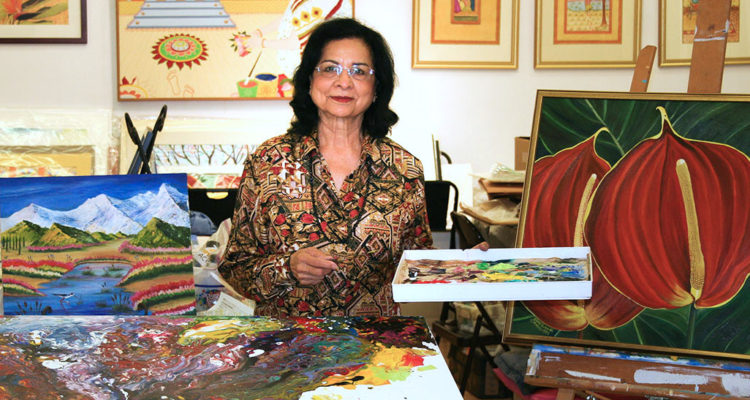“My inspiration comes from nature…”
Paul Zimmerman in conversation with Subodh Maheshwari
Paul Zimmerman: How did you develop interest in art?
Subodh Maheshwari: For as long as I can remember I have always been interested in art, music, and folk art. It’s like I was in a different world when I was making artwork. I decided to get a bachelor’s degree in India at Agra University. I majored in drawing and painting as well as in sitar, an Indian instrument. I then got married and had children. For many women, when this happens, your priorities shift and your interests take a back seat. Raising a family was my first priority. When my children left to go to college, I then started going to college as well. In 1980 I started at California State University, Fullerton to pursue my Bachelors of Fine Arts. Don Lagenberg was the professor of my life drawing class, and he really encouraged me and helped bring out the Indian style in my artwork. The faculty told me that if I kept up at the rate I was going I would become a very good artist. The sentence spoke to my heart and mind, because it echoed what my own inner voice was telling me. I wanted to become a good artist and I wanted to be able to teach art, so after receiving my BFA, I enrolled in University of California, Irvine’s Masters of Fine Arts program. There, I was chosen to receive a fellowship for my artwork and a teaching assistantship. When I finally finished my Masters of Fine Arts degree in 1989, I was given a teaching job at UCI, and I finally knew I was an artist. I also started teaching art at Riverside Community College in 1990 and have been there ever since.
PZ: What is the most challenging aspect of your work?
SM: I find that my symbolic and abstract paintings are challenging for viewers to understand. I think much of this comes from lack of exposure to art. Individuals with artistic exposure can immediately spot the symbols I use in my artwork and relate to them; people with less exposure may not be able to fully understand my symbolic or abstract works until they are given the meaning.
Personally I find the most challenging aspect of my work is finding time to create it! Teaching and marketing take up many hours of my day. This is every artist’s problem: we don’t want to cook, clean, eat, or sleep; we just want to paint.
PZ: What is your artistic process? How do you create your paintings?
SM: I use all of the mediums: charcoal, pen and ink, pastels, mix media, acrylics, oils, gouache, watercolors, and graphite. If I desire detailed work, I use watercolor or gouache. If I want to have very bold and bright colors I would utilize oils and acrylics. I cannot choose one I love the most; I adore all of the mediums for their own special characteristics. I feel very lucky I can utilize all of the mediums to an exceptional degree.
I make abstract, floral, symbolic, and landscape paintings. In all of them, you will see a lot of layers and intricate designs. Specifically in my abstracts, I use layers and layers of colors, and transparency. In my floral paintings I use mediums that show velvety softness and extreme detail. In my symbolic paintings I tell a story and help the viewer empathize with the emotions I feel. In my landscape paintings I use whatever medium I feel fits well with each scene I am making. Sometimes the subject matter comes first when I create, sometimes it doesn’t. There are times when I do an abstract painting and I have an idea of what I will do. Other times I start painting and go on a journey, but I do not know the destination.
The only thing I always do is pick a color palette before starting a painting. I like to make sure all of the colors resonate with one another. I either choose harmonious colors, opposing colors, or mono colors, depending on my feelings. When I use strong fiery colors of red or orange, I’m expressing love or anger. Grey or black is used to express sadness. Pink is for prosperity. Green is for growth. Yellow is utilized for brightness and to be uplifting. Blue is very spiritual and peaceful. White is for purity. All of my colors hold meaning and emotions. They are not chosen randomly, but each color corresponds to a feeling.

PZ: Do you have any particular goal in mind when your start a new piece?
SM: My inspiration comes from nature, experiences, emotions, social issues, global warming, and politics. I am very influenced by what is happening in the now. Nature is very inspiring to me as well. When there is conflict in life, people crave being outside such as walking in the park, visiting the forest, and traveling to the mountains. Why? Nature can provide peace for one’s body and soul. Nature has given us so many things, including life, and now we are destroying nature. Global warming, pollution, and extinction have all been created because of humanity. Coral reefs are dying, the polar ice caps are melting away, and weather is becoming extreme. The only way these problems can be resolved is if humanity takes care of the earth and takes care of each other.
Trees also inspire me very much. They provide oxygen, shade, fruit, and leaves. When trees bear fruit, they bend down towards the ground and bow their heads, being thankful for what they are given. When we are given better things in our lives, such as money, better jobs, and things we want, we need to remember to be humble like a tree. We need to remember who we used to be and be thankful for what we have been given.
PZ: How do you know when the painting is finished?
SM: After I initially think a painting is finished, I leave it in my studio for a few days. I let the painting speak to me. I tweak things here and there, and do my finishing touches. The most important part of this step in the process is making sure the viewer is able to understand the message I am trying to convey. The last thing I do is write my name on a painting.
PZ: Has your practice changed over time?
SM: When I first started making artwork out of college, I focused on learning new techniques. I studied old masters and famous contemporary art. As time went on, I became increasingly influenced by current problems in our world like social issues, global warming, and politics. These all make a statements in my current works. I feel I have been able to vastly improve my artwork and get my messages to the viewers more efficiently.
PZ: Which artists are you most influenced by?
SM: My favorite artist is Georgia O’ Keefe. She has inspired my floral paintings. She made paintings of very small flowers, but enlarges them. Sometimes when things are small, people don’t see the hidden beauty in them. So, when I do my flower paintings I always look at the flowers with a magnifying glass, and you would be surprised just how much we miss in their beauty when we seem them with only our eyes. I appreciate and am influenced by 16th and 17th century Rajasthani and Mogul art. My work is also accented by poetry, passages, and phrases in Hindi, Sanskrit, and English. Old masters such as Michelangelo, Rembrandt, Van Gough, Picasso, etc. also have influenced my paintings. I studied their work in school, and the impression they have on the art world is everlasting.
PZ: How would you define art?
SM:Artwork is a universal language; it is not always beautiful. Art tells history, emotions, stories, and many other things—both the good and the bad. Art concerns technical studies such as color, composition, mark making, etc. All things listed above could be considered beautiful art, as long as someone was truly expressing themselves. One way you know a piece of art is beautiful is when you see a painting, and it sees you too. You hear it speak to you; you feel the emotions the painting has.
PZ: What are you working on now?
SM: Currently, abstracts and flowers are coming to life in my studio. In the future, I am planning to paint subject matters such as global warming, beautiful California poppies, and to finish my series ‘Under the Ocean’ for a total of seven paintings. I will also create more symbolic artwork.
PZ: How does the pandemic influence your work and sensibility?
SM: The pandemic has influenced my work tremendously. Throughout this time, many people have written off COVID-19 as just a hoax, creating turmoil within our country, but I have always been saddened by the toll this virus has taken. In Easter time of 2020, I made a painting showing the importance of wearing masks and maintaining six-foot distance. It hurts me to see such lack of respect for one another within our country. While people were lying in hospital beds dying, others blatantly ignored precautions set forth by scientists, and even today continue to spread the virus. I truly felt pain when the virus reached into my personal life— taking the lives of many friends and almost taking the life of my son. When my son got sick, I felt as if I was being dragged into a black hole, being drowned with uncertainty. To find peace in life I painted, and found myself creating calming ocean scenes. My biggest paintings to come out of this pandemic was the ‘Under the Ocean’ series. I felt that under the ocean was the safest place on earth during the pandemic. I am very hopeful now, as our government is finally taking the pandemic seriously and vaccines are available to the public.
